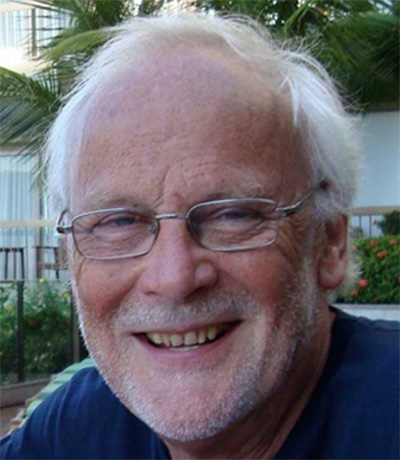In memoriam: Michael Waterfield
Michael Derek Waterfield, a British biochemist and a pioneer in the cancer research field died on May 11, 2023, at the age of 82, the American Society for Biochemistry and Molecular Biology learned recently. He had been an ASBMB member since 1996.

Born in Hampshire, United Kingdom on May 14, 1941, Waterfield completed his undergraduate studies in biochemistry at Brunel University, London. He then earned his Ph.D. in protein chemistry and enzymology from King’s College Hospital Medical School, London. He moved to Harvard Medical School in 1967 to pursue postdoctoral studies in which he quantified the method of sequential degradation of proteins and peptides.
Following a second postdoctoral stint with American biologist Leroy Hood at the California Institute of Technology on first gas phase protein sequencer and upon receiving a fellowship from the American Heart Foundation, Waterfield joined the Imperial Cancer Research Fund, or ICRF, in London in 1972. His research group and technical team at ICRF were the first to implement a first-generation state-of-the-art protein sequence database.
Waterfield developed his interest in studying growth factor receptors. Using highly purified fibroblast‐derived growth factor, or FDGF, he reported a structural resemblance between platelet‐derived growth factor and FDGF. His group also found the relationship between epidermal growth factor receptor, or EGFR, and oncogenes and was the first to sequence protein kinase C. Waterfield was instrumental in groundbreaking cancer research in ICRF, and his findings led to development of anti-cancer drugs targeting the EGF receptor family.
In 1986, Waterfield joined the Ludwig Institute for Cancer Research at University College London as director. He developed his interest in the critical growth regulatory enzyme phosphatidylinositol 3-kinase, or PI3K, and started working on its sequence. He also founded a biotech company Piramed where six drugs targeting PI3K enzymes were clinically approved.
Waterfield had more than 151 publications in journals such as Nature, Science, and the Journal of Biological Chemistry, with more than 39,352 citations. He also broadened research horizons in cancer proteomics by opening a proteomics lab at University College London. He retired in 2008.
Waterfield was a fellow of the Royal Society, the Royal College of Pathologists and the Academy of Medical Sciences U.K. He was recognized with the Royal Society's Buchanan Medal in 2002 for his exceptional skill in protein biochemistry and the Biology and Biochemistry in Belgium Leader Award in 2023.
He is survived by his wife, Sal, and his daughters, Lucy and Rosie.
Enjoy reading ASBMB Today?
Become a member to receive the print edition four times a year and the digital edition monthly.
Learn moreGet the latest from ASBMB Today
Enter your email address, and we’ll send you a weekly email with recent articles, interviews and more.
Latest in People
People highlights or most popular articles

2026 ASBMB election results
Meet the new Council members and Nominating Committee member.

Simcox wins SACNAS mentorship award
She was recognized for her sustained excellence in mentorship and was honored at SACNAS’ 2025 National Conference.

From humble beginnings to unlocking lysosomal secrets
Monther Abu–Remaileh will receive the ASBMB’s 2026 Walter A. Shaw Young Investigator Award in Lipid Research at the ASBMB Annual Meeting, March 7-10 in Washington, D.C.

Chemistry meets biology to thwart parasites
Margaret Phillips will receive the Alice and C. C. Wang Award in Molecular Parasitology at the ASBMB Annual Meeting, March 7-10 in Washington, D.C.

ASBMB announces 2026 JBC/Tabor awardees
The seven awardees are first authors of outstanding papers published in 2025 in the Journal of Biological Chemistry.

Decoding how bacteria flip host’s molecular switches
Kim Orth will receive the Earl and Thressa Stadtman Distinguished Scientists Award at the ASBMB Annual Meeting, March 7–10, just outside of Washington, D.C.

